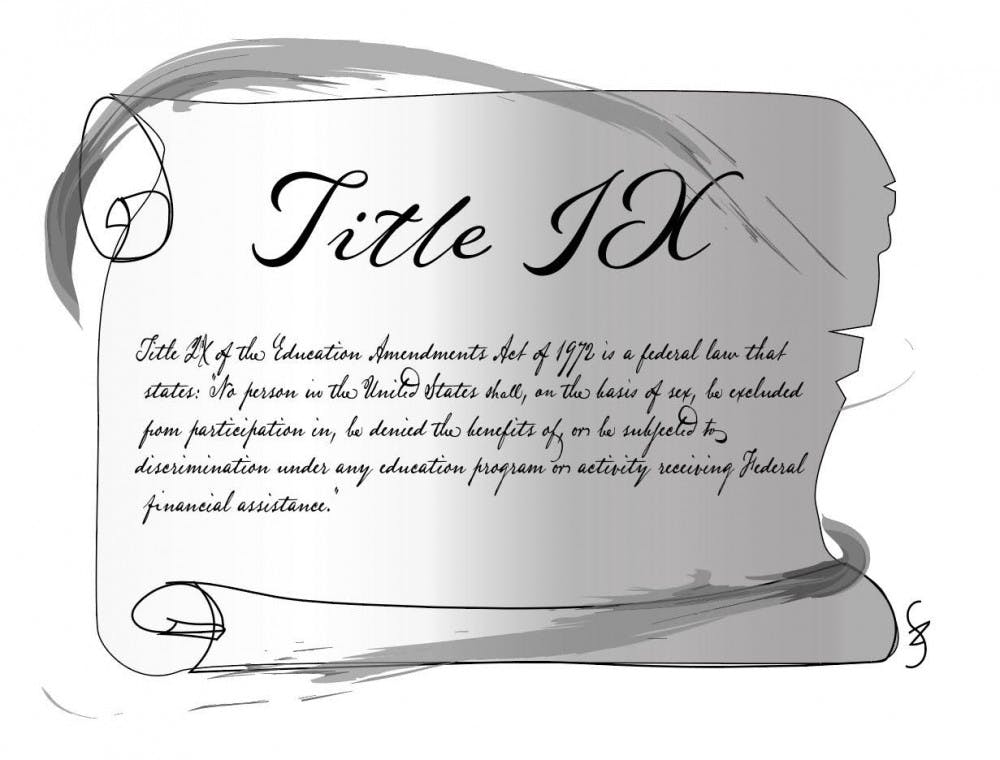The University narrowed the jurisdiction of its Title IX policy, changed how it defines sexual harassment and authorized cross-examination during live hearings in response to new regulations released by the U.S. Department of Education in May.
Changes to federal Title IX regulations have impacted University policy on sexual and gender-based harrassment, sexual assault, relationship and interpersonal violence and stalking, according the University’s Aug.14 announcement. Title IX Program Officer Rene Davis led the process of revising the University’s Title IX policy as required by federal law.
Title IX, a federal law passed in 1972, prohibits “discrimination on the basis of sex in any education program or activity that receives federal funding.” Colleges and universities in the U.S. were legally required to comply with the new Title IX regulations announced May 6 by Aug. 14.
The new federal guidelines allow colleges to use a higher standard of proof than was previously necessary for sexual misconduct cases, limiting which cases a college or university must act upon, and also requiring colleges and universities to hold a live hearing for cases of alleged sexual misconduct, The Herald previously reported. The University will maintain its previous standard of proof — the preponderance of evidence standard, in which more than 50 percent of evidence must point to a conduct violation — moving forward.
Jamila Beesley ’22, a Sexual Assault Peer Education coordinator at the University, believes that these new Title IX policies will deter survivors from reporting cases of sexual misconduct. “These changes are really frustrating to see,” she said. “It really does limit the avenues that help survivors reach justice. It was only under the Obama administration that more helpful changes were made and it’s unfortunate to see them go away so soon.”
It is well documented that sexual misconduct on Brown’s campus is underreported, which is in line with trends at other universities. New policies may potentially exacerbate this problem, Davis said. “Adding this element to a campus process could have a chilling effect on individuals coming forward,” she said.
The opportunity to cross-examine survivors and witnesses of sexual misconduct during the formal complaint process could present barriers to those who have recently had a traumatic experience, Beesley said. “It can be really traumatizing for survivors … to have someone question and repeat everything they went through.”
The change in the definition of sexual harassment may also be “really harmful” to students attempting to report, Beesley said.
“The new standard requires that the behavior be severe, pervasive and objectively offensive from a reasonable person’s perspective,” Davis said. This has the potential to discourage students from reporting cases of sexual misconduct as it “requires that all three prongs are met.” Under the Obama administration, sexual harassment was more broadly defined as “any unwelcome conduct of a sexual nature,” The Herald previously reported.
Beesely emphasized that the University’s formal Title IX complaint process is not the only pathway open to survivors for closure and justice. “I want survivors to be able to pursue whatever they need for healing, including reporting that results in punitive measures for perpetrators,” Beesely said. “That said, I would like to see more transformative justice systems that are not necessarily punitive but potentially preventative,” she added.
“It has become painfully clear that we need to create robust alternatives within our own community that don’t rely on the state to enforce them, but still validate the harm that’s been done,” Beesely said.
The University is also in the process of developing a sexual and gender-based misconduct policy to address behavior that occurs outside of the new, narrower jurisdiction of Title IX. This policy will “address prohibited conduct in University programs and activities abroad and address conduct that occurs outside of the purview of Brown’s programs and activities but has an ongoing discriminatory effect on campus,” Davis wrote in the Today@Brown announcement.
The University’s revised Title IX policy and procedure also includes efforts to bolster the informal resolution process — “an alternative to the investigation and adjudication model” that includes a facilitated resolution acceptable to both the complainant and respondent, according to the Title IX and Gender Equity Office.
“Accountability looks different within different communities. An informal resolution provides … an alternative method of seeking accountability,” Davis said. “Strengthening the informal resolution options enhances our ability to meet the needs of our diverse community. I hope our community sees our procedures as an inclusive and meaningful effort,” she added.
Correction: A previous version of this article stated that "The new federal guidelines necessitate a higher standard of proof than was previously necessary for sexual misconduct cases." In fact, the new federal guidelines allow schools to decide on a standard of proof consistent with how they handle cases, and Brown will continue to use the preponderance of evidence standard. The Herald regrets the error.

ADVERTISEMENT




